


This article highlights ten critical heart failure symptoms that elderly patients should recognize, such as shortness of breath, fatigue, and swelling in the legs. These signs can indicate underlying cardiac dysfunction, and understanding them is vital for your health. By educating patients on these symptoms, we emphasize the importance of early detection and intervention. Recognizing these signs can lead to timely medical attention, which is essential for improving heart health outcomes for older adults. Remember, you are not alone in this journey—seeking help can make a significant difference.
Recognizing the symptoms of heart failure is crucial, especially for our elderly loved ones, who may experience subtle signs that can easily be overlooked. From shortness of breath to swelling in the legs, these indicators can significantly impact health and quality of life. As heart failure becomes increasingly prevalent among older adults, a pressing question arises: how can individuals and their caregivers identify these symptoms early enough to seek timely medical intervention? This article explores ten key heart failure symptoms that every elderly patient should be aware of, empowering them to take proactive steps toward better heart health. Together, we can navigate this journey toward wellness.
At Amavita Cardiovascular and Vascular Health, we understand how vital it is to recognize the early signs of cardiac failure, especially for older adults who might exhibit subtle symptoms that can easily be overlooked. Common signs to be aware of include:
Valvular issues can occur when the heart's valves do not open or close properly, causing the heart to work harder, which can lead to breathlessness and increased fatigue. By understanding these indicators, both patients and their loved ones can seek timely medical advice, significantly improving cardiovascular health management.
Our comprehensive cardiac assessments help identify the specific causes of fatigue and other related issues, allowing us to create personalized treatment plans that aim to enhance heart function and restore energy levels. Additionally, Dr. Martinez-Clark specializes in minimally invasive valve treatments, which can repair or replace damaged valves without the need for open-heart surgery, leading to remarkable improvements in breathing and energy. We prioritize educating our patients, ensuring they are informed about the . This proactive approach not only raises awareness but also encourages timely action, ultimately resulting in better health outcomes.
Research shows that individuals who are well-informed are more likely to recognize symptoms early, facilitating prompt interventions and improving heart failure management. Furthermore, our innovative AI-powered diagnostic technology, part of the Amavita CardioElite™ program, enhances early detection, enabling informed decisions and better patient outcomes. Seeking prompt medical attention is crucial; early identification of symptoms can lead to improved treatment options and a better quality of life. We are here to support you every step of the way.
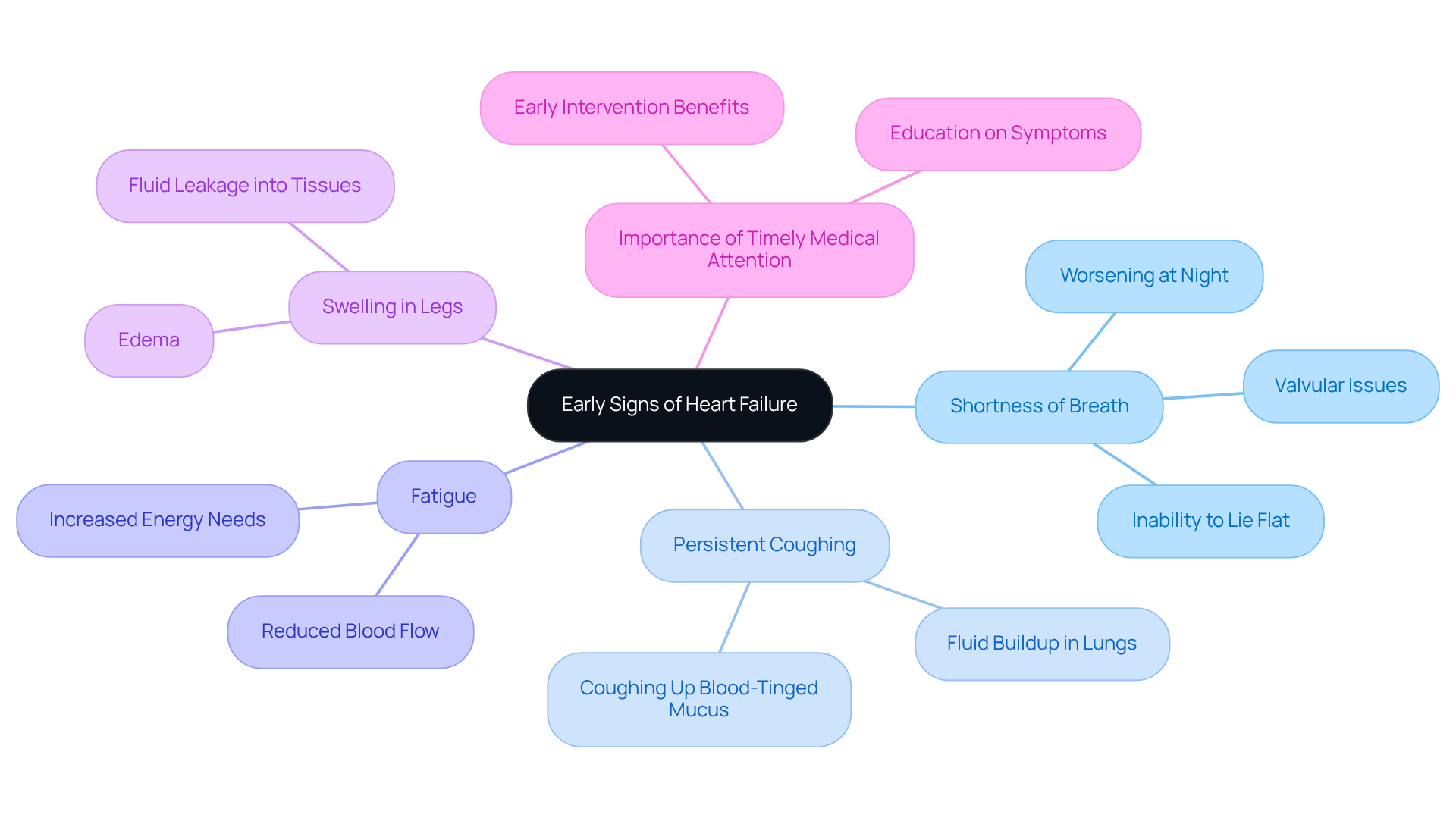
Shortness of breath, or dyspnea, is often the first and most noticeable among heart failure symptoms. It can occur during physical activity or even while resting, especially when lying flat. For elderly patients, this symptom may be mistaken for a normal part of aging or attributed to other health issues. However, it’s crucial to recognize dyspnea as a potential warning sign of heart failure symptoms, indicating that the heart may be struggling to pump blood effectively, possibly due to valve disease. Valve problems can cause the heart to work harder, resulting in such as breathlessness and fatigue.
Did you know that around 20% of individuals over 75 experience cardiac issues, with heart failure symptoms like dyspnea being a common sign in this age group? Furthermore, research shows that nearly 40% of older adults with cardiovascular problems also have atrial fibrillation, which can exacerbate breathing difficulties. The median survival rate for older individuals admitted with cardiac failure is approximately 2.5 years, highlighting the importance of recognizing this symptom early.
At Amavita Heart and Vascular Health, Dr. Martinez-Clark specializes in minimally invasive valve treatments that can significantly improve both breathing and energy levels, often allowing for same-day discharge. Our innovative AI-powered diagnostic technology enhances early detection and patient outcomes, while our comprehensive cardiac evaluation identifies the specific cause of your fatigue. Based on your diagnosis, we create a personalized treatment plan aimed at improving your heart function and revitalizing your energy.
Understanding the implications of dyspnea as it relates to heart failure symptoms and cardiovascular health is essential. Prompt identification and action can greatly enhance outcomes for older adults facing cardiac challenges. We are here to support you every step of the way, ensuring you feel valued and cared for as you navigate your health journey.
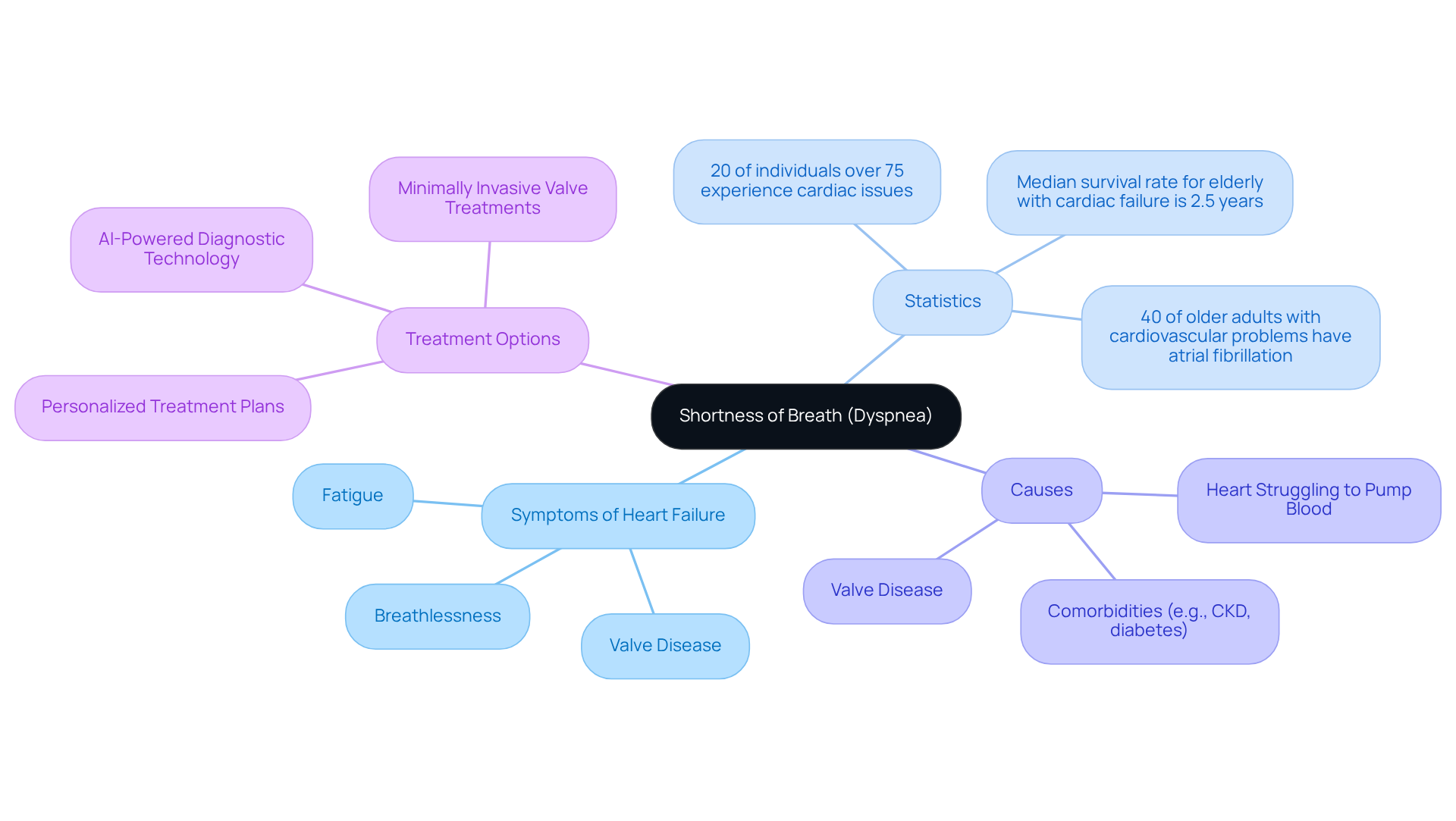
Swelling in the legs and ankles can be a concerning sign of cardiac dysfunction, often caused by fluid accumulation in the body. This condition, known as edema, may lead to discomfort and mobility challenges, particularly for older adults. Did you know that over 6 million people in the United States are affected by congestive cardiac failure? Fluid retention is a common complication that can arise. It’s important for individuals and caregivers to be vigilant about any sudden or unexplained swelling, as it could signal heart failure symptoms that indicate the heart is struggling to pump blood effectively.
At Amavita Heart and Vascular Health, our vascular specialists understand the urgency of timely evaluation. We employ advanced imaging techniques to explore the underlying causes of swelling and fluid retention, ensuring that high-risk patients receive the they need. Remember, untreated fluid accumulation can exacerbate mobility issues and overall health, making early detection crucial. Furthermore, keeping an eye on sudden changes in weight is vital, as it can indicate worsening fluid retention.
Our comprehensive cardiac assessments lead to personalized treatment strategies focused on improving cardiac function and enhancing the quality of life for those affected. We are here to support you every step of the way, so don’t hesitate to reach out for help.
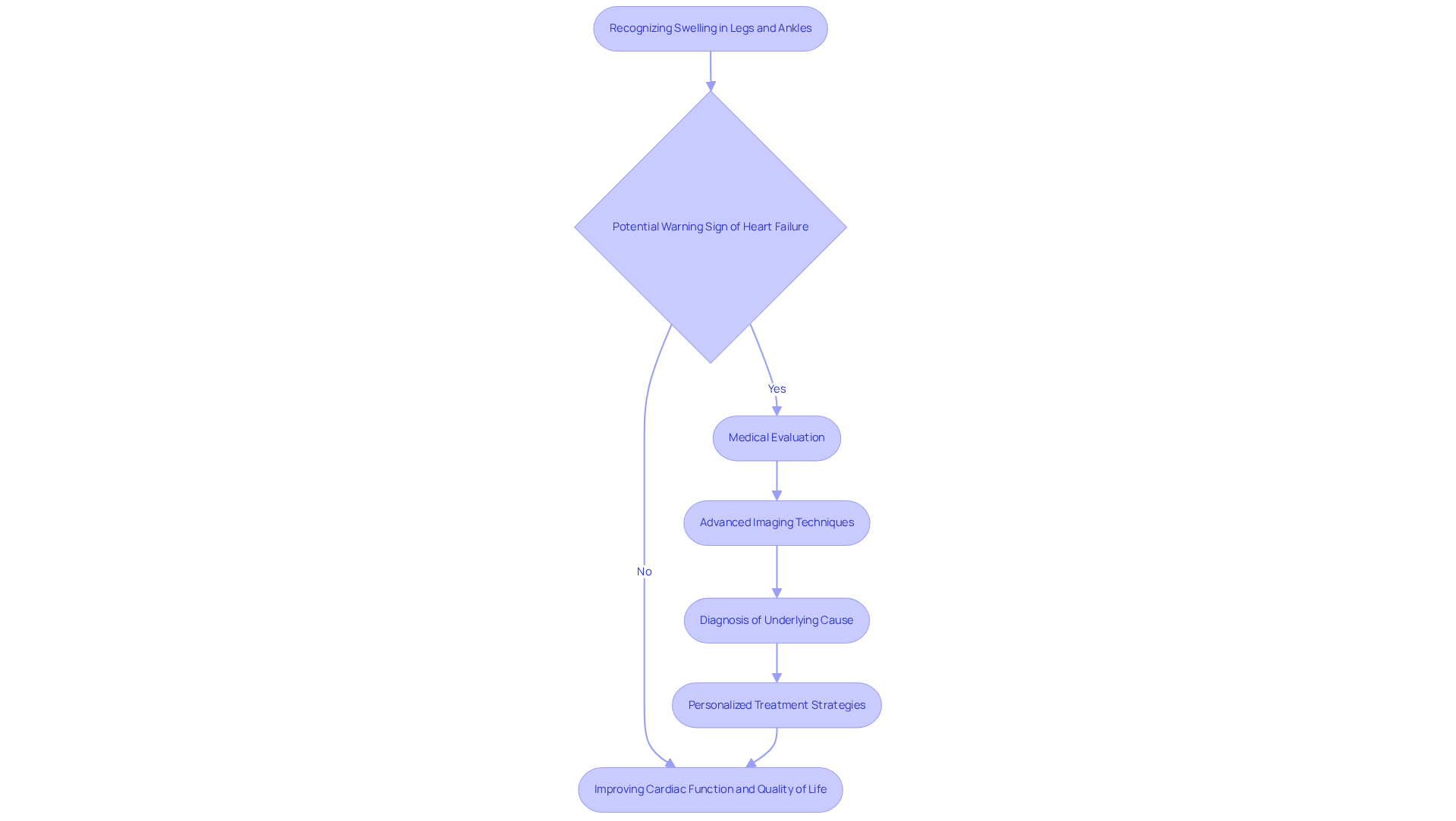
Tiredness is a common yet often overlooked sign of potential cardiac issues, especially among older adults, and can be considered one of the . Have you noticed unusual tiredness or weakness even after minimal exertion? This may signal underlying cardiovascular conditions, such as coronary artery disease or symptoms of heart failure. This fatigue can stem from heart failure symptoms, which reflect the heart's struggle to supply adequate blood flow to meet the body's needs, making it essential to recognize its implications.
At Amavita Heart and Vascular Health, we understand how vital it is to address heart failure symptoms, as they can significantly affect your daily activities and overall quality of life. Our comprehensive cardiac assessments are designed to identify the specific reasons for your fatigue, allowing us to create tailored treatment strategies that focus on improving cardiovascular function and revitalizing your energy levels.
Furthermore, by implementing preventive strategies, we aim to enhance the well-being of our elderly patients and reduce the risk of serious heart-related issues. Remember, you are not alone in this journey, and we are here to support you every step of the way.
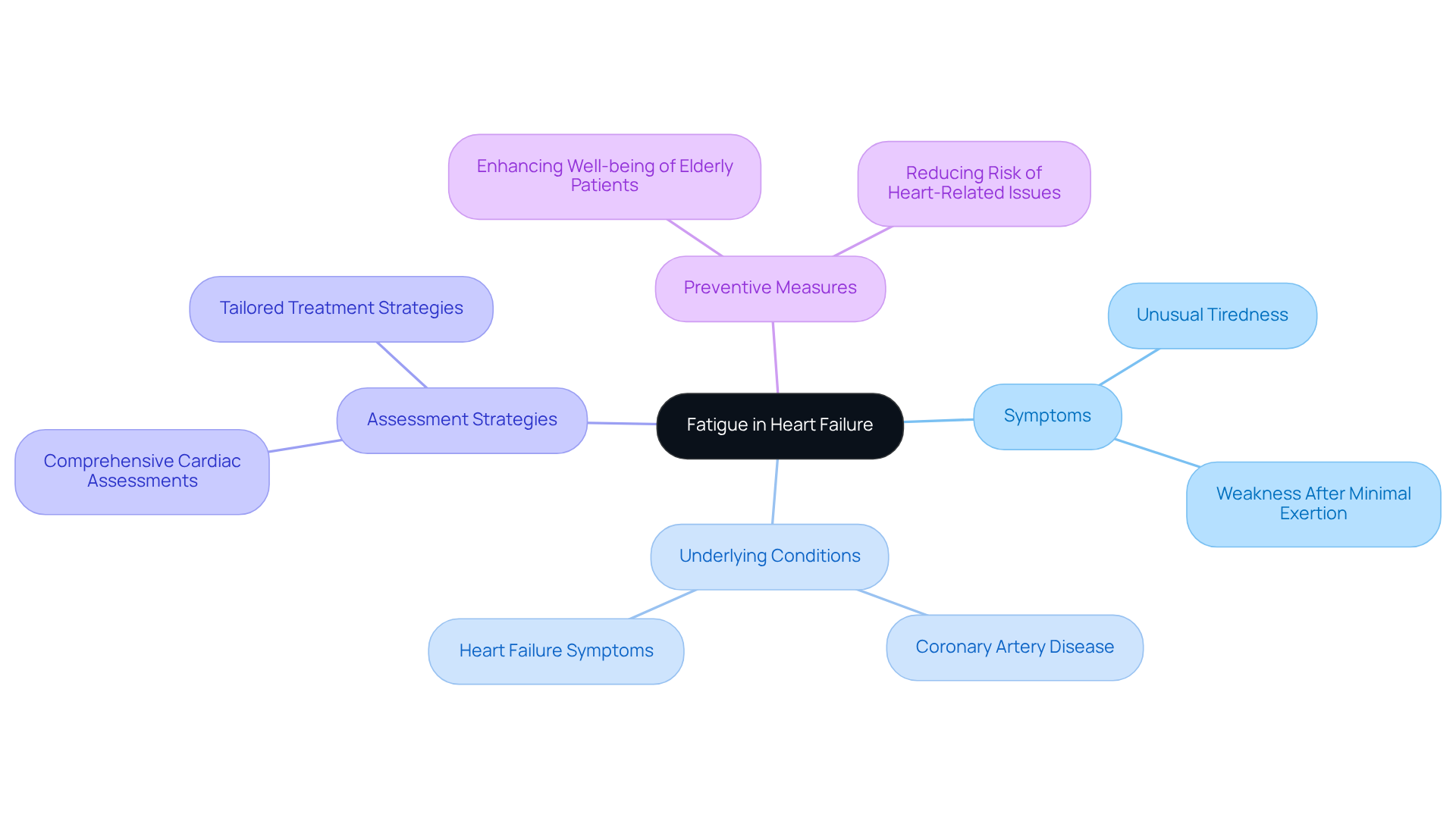
A sudden increase in weight, especially over a short period, can be concerning as it may indicate heart failure symptoms caused by fluid retention. This condition arises when heart failure symptoms occur, indicating that the heart struggles to pump blood effectively, which leads to excess fluid accumulation in the body. For older individuals, tracking weight consistently is essential; even a weight increase of more than 2 pounds in a week can signal declining cardiac function and may lead to heart failure symptoms, significantly heightening the risk of hospitalization.
At Amavita Heart and Vascular Health®, we are here to support you with innovative AI-powered diagnostic technology. Our portable, FDA-cleared AI ultrasound offers real-time guidance and generates reports on heart structure and function within minutes. This advanced method not only enhances early detection but also empowers you to take proactive steps in managing your health.
We take pride in our , which adheres to high evidence-based care standards, ensuring credibility and marketability. Cardiologists emphasize the importance of self-advocacy in healthcare, encouraging you to communicate any significant weight changes to your healthcare provider promptly. Recognizing heart failure symptoms can be crucial for timely intervention and management of cardiac issues, ultimately improving your health outcomes.
Remember, you are not alone in this journey. We are here to help you navigate your health concerns with understanding and compassion.
A persistent cough, especially one that produces pink or frothy sputum, may indicate fluid accumulation in the lungs, a situation often associated with heart failure symptoms. This sign is often misunderstood as a respiratory infection or allergy, which underscores the among older individuals. At Amavita Heart and Vascular Health®, we prioritize comprehensive cardiac assessments that consider risk factors such as:
to identify these signs early.
Did you know that coughing can occur in 3.9% to 35% of individuals taking ACE inhibitors, a common treatment for heart issues? This can complicate the recognition of this important symptom. If you or a loved one experiences a persistent cough, it is crucial to consult a healthcare provider for a thorough evaluation. Timely intervention can significantly improve health outcomes.
Our advanced imaging and testing services are designed to facilitate accurate diagnoses and enhance early detection. By identifying the heart failure symptoms promptly, we can improve the management of cardiac dysfunction and elevate your overall quality of life. Furthermore, we encourage older individuals to closely monitor their symptoms and reach out to a healthcare professional if they notice any changes. Remember, you are not alone in this journey; we are here to support you every step of the way.
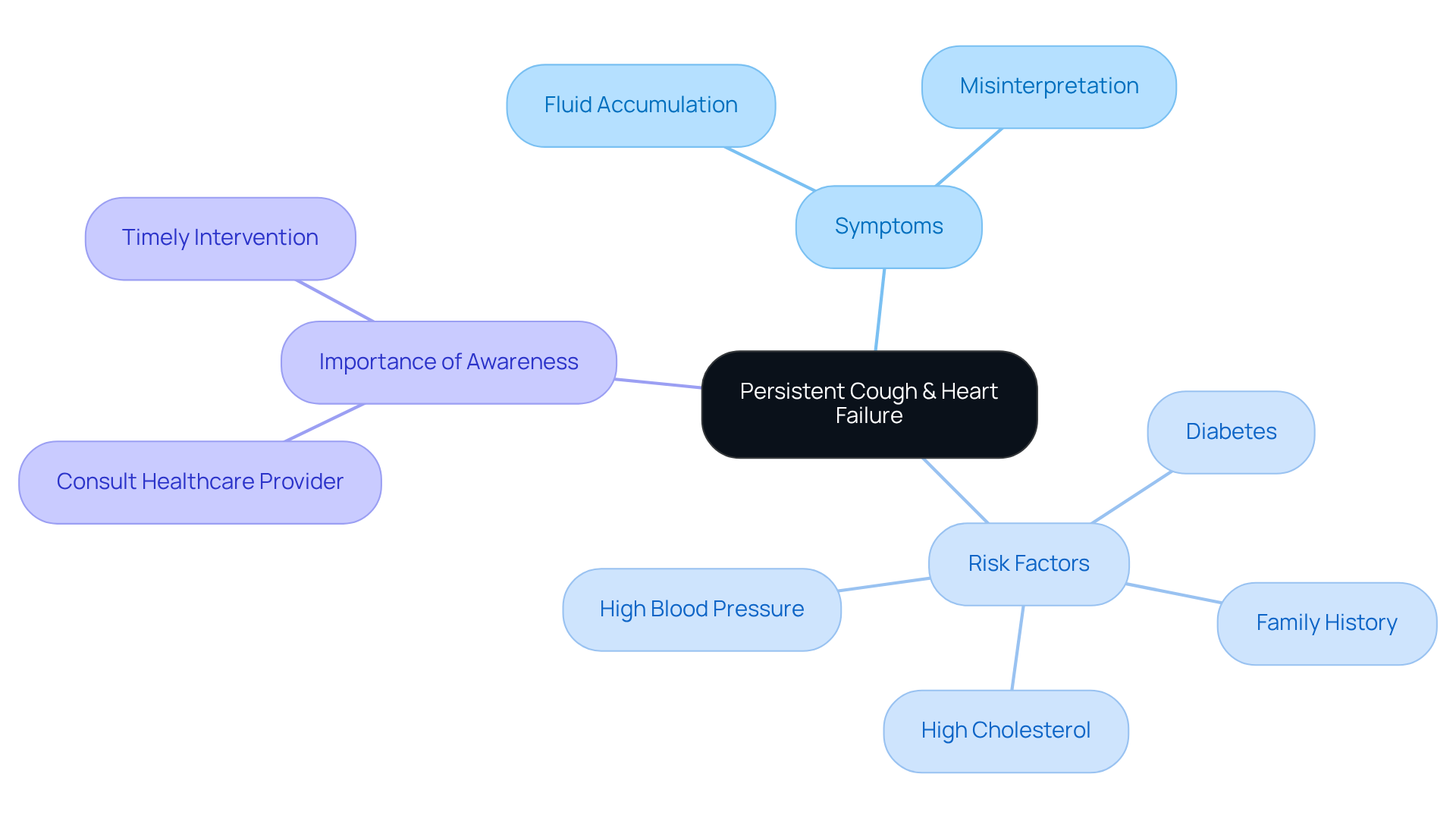
Older individuals facing cardiovascular issues often experience significant changes in their appetite. This may manifest as a reduced desire to eat or a sensation of fullness after consuming only small amounts. These shifts can be linked to fluid retention and the body's altered metabolism, which are common heart failure symptoms. Such changes are not just minor inconveniences; they can lead to malnutrition and worsen existing health problems if not addressed properly.
Nutritionists emphasize that appetite reduction in those with cardiac issues can stem from various factors. These include:
For example, polypharmacy can diminish appetite and lead to malnutrition due to drug-induced taste disorders, as highlighted by Y. Kinugasa. Additionally, research indicates that nearly 40% of individuals in the later stages of heart failure experience constipation, which further complicates their nutritional status.
Understanding the is crucial for taking timely action. A proactive approach to monitoring dietary intake and addressing changes in appetite can greatly enhance health outcomes. Older individuals should feel encouraged to share any changes in their eating habits with their healthcare providers. This open communication can lead to personalized nutritional support and interventions that improve their quality of life. Regular observation of these indicators is also essential for effectively managing cardiac issues and heart failure symptoms that may arise.
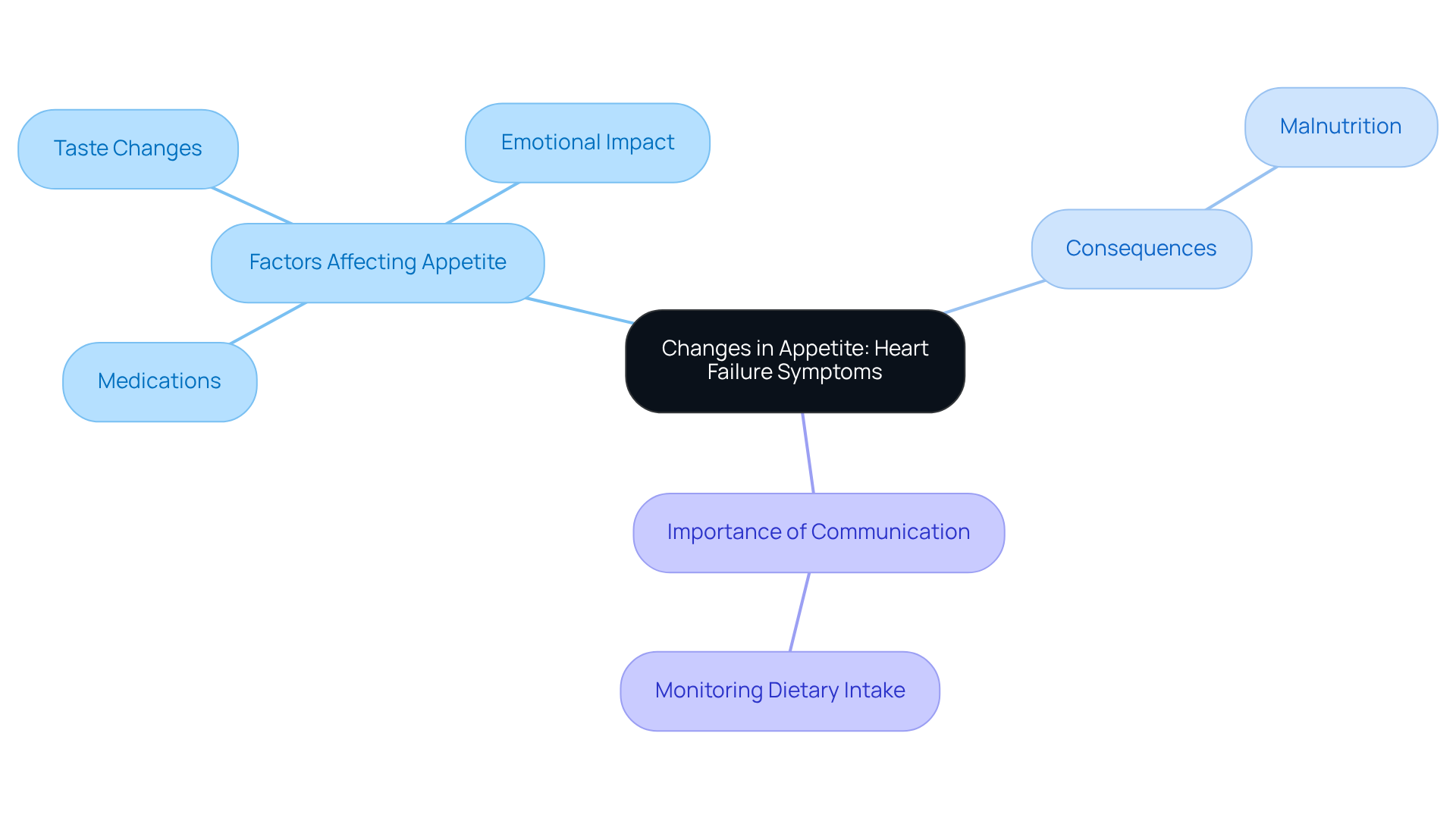
Sleep disturbances, such as insomnia and frequent awakenings, are often overlooked signs of heart failure symptoms, particularly in older individuals. It's concerning to note that a significant number of older adults with heart conditions report poor sleep quality, with studies showing that 60-75% of these patients experience sleep problems. Insomnia can manifest as difficulty falling asleep, staying asleep, or waking too early, and it may be exacerbated by symptoms like shortness of breath and anxiety related to heart issues.
Recognizing insomnia as a possible indicator of cardiac problems is crucial. Sleep specialists emphasize that insomnia not only diminishes quality of life but can also negatively impact cardiovascular health. In fact, individuals with cardiac dysfunction who suffer from insomnia may be at a higher risk for serious adverse cardiovascular events (MACE). Research indicates that 31.09% of these patients face future MACE, including 17.65% experiencing lethal events. This connection underscores the importance of regularly assessing sleep issues as part of cardiac care.
Moreover, the prevalence of insomnia among seniors with cardiac insufficiency is alarming, as it can create a cycle of poor sleep and worsening heart failure symptoms. Addressing these sleep challenges is vital, as inadequate rest can exacerbate cardiovascular issues and harm overall well-being. By prioritizing sleep quality, healthcare professionals can play a significant role in improving outcomes for elderly individuals grappling with heart conditions.
If you or a loved one is experiencing sleep disturbances, consider reaching out to a healthcare provider. Together, we can explore ways to and, in turn, support heart health. Remember, you are not alone in this journey, and there is help available to improve your quality of life.
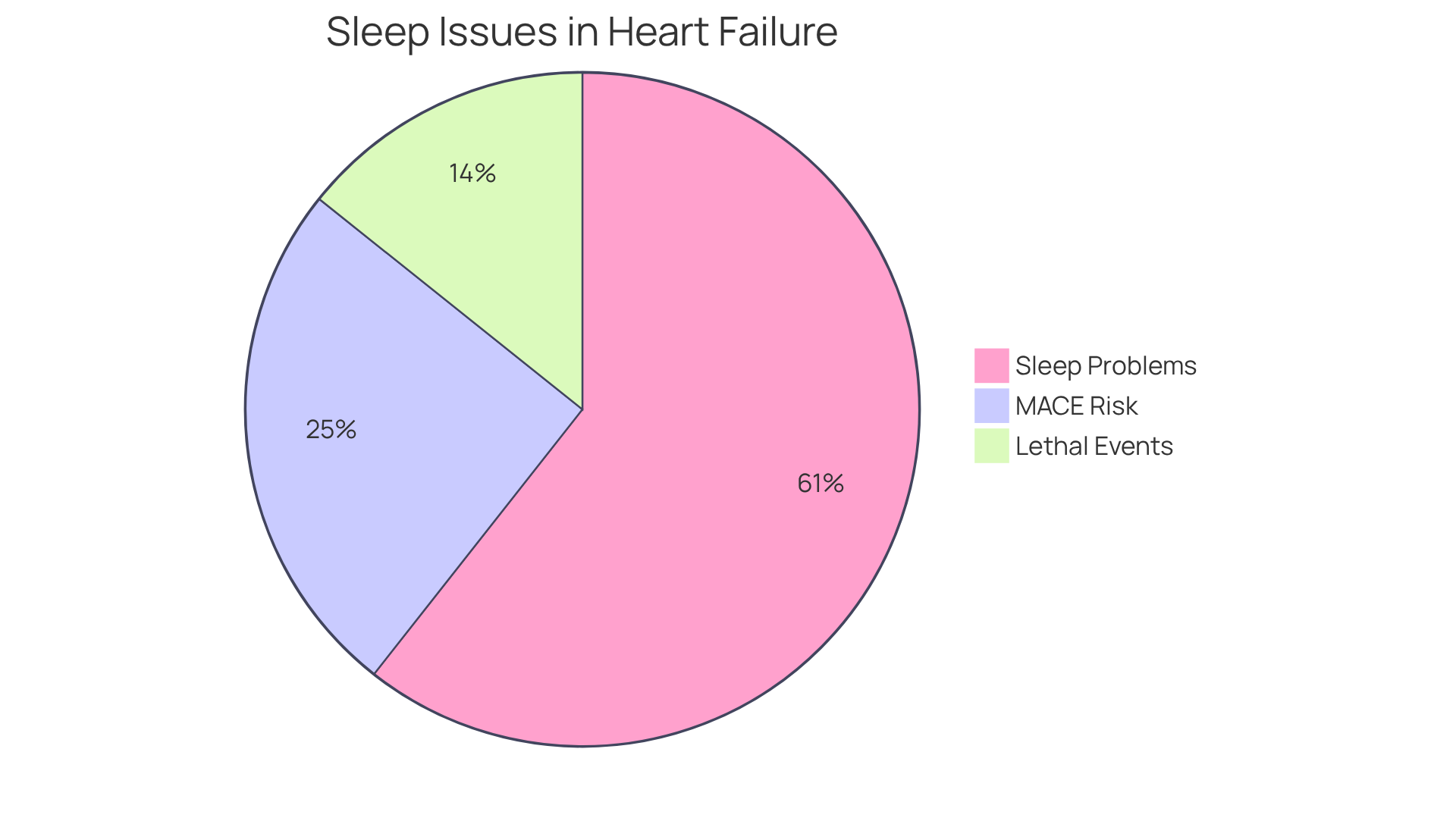
Heart dysfunction can deeply affect the emotional well-being of elderly patients, often leading to increased anxiety, depression, and feelings of isolation. Have you or a loved one felt this way? Research indicates that nearly 40% of elderly individuals with heart conditions experience significant signs of depression, complicating their overall health care. This emotional burden not only reduces their but also affects their commitment to treatment plans and recovery outcomes.
Psychologists stress the importance of addressing these emotional symptoms; as one noted, 'The psychological toll of chronic illness can be as debilitating as the physical symptoms themselves.' Therefore, it is essential for caregivers and healthcare professionals to prioritize emotional support as a vital part of a comprehensive approach to cardiac management.
By recognizing and addressing the psychological challenges associated with heart issues, we can enhance care and improve overall health outcomes. Remember, you are not alone in this journey, and seeking support is a courageous step towards better health.
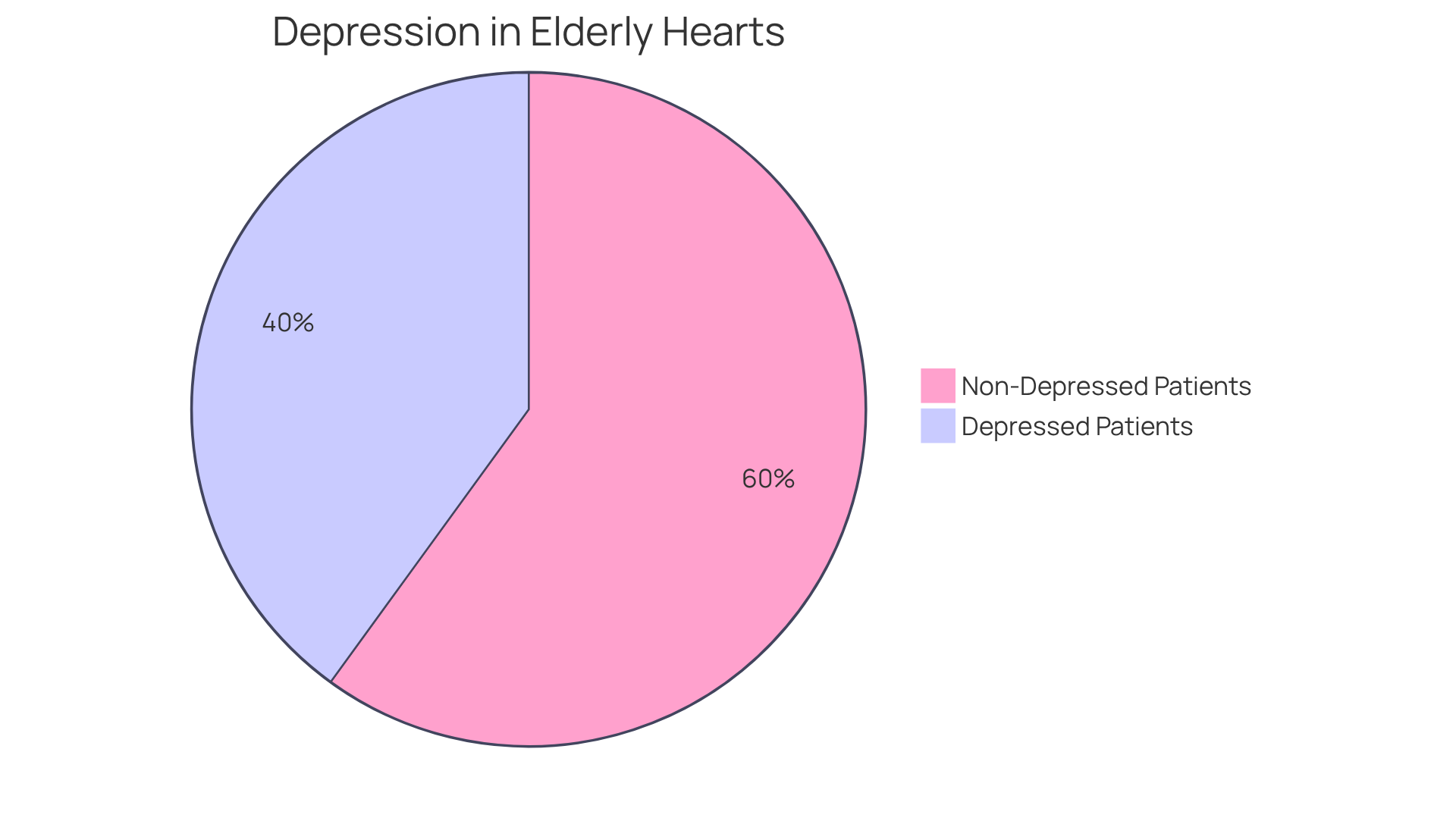
As we age, it becomes increasingly important for older patients to remain vigilant about the signs of cardiac issues and to know when to seek medical assistance. If any symptoms worsen or new ones appear, reaching out to a healthcare provider promptly is vital. Research shows that early intervention can greatly improve outcomes and enhance the quality of life for those living with heart failure. Cardiologists emphasize that recognizing symptoms early leads to timely care, which is essential for effectively managing the condition.
Unfortunately, many older individuals delay seeking help, often due to misunderstandings about their symptoms or fear of a diagnosis. Therefore, it is crucial for both individuals and caregivers to be aware of heart failure symptoms, such as:
By being proactive and informed, elderly patients can take meaningful steps toward better heart health and overall well-being. Remember, you are not alone in this journey; support is available, and taking action can lead to a healthier future.
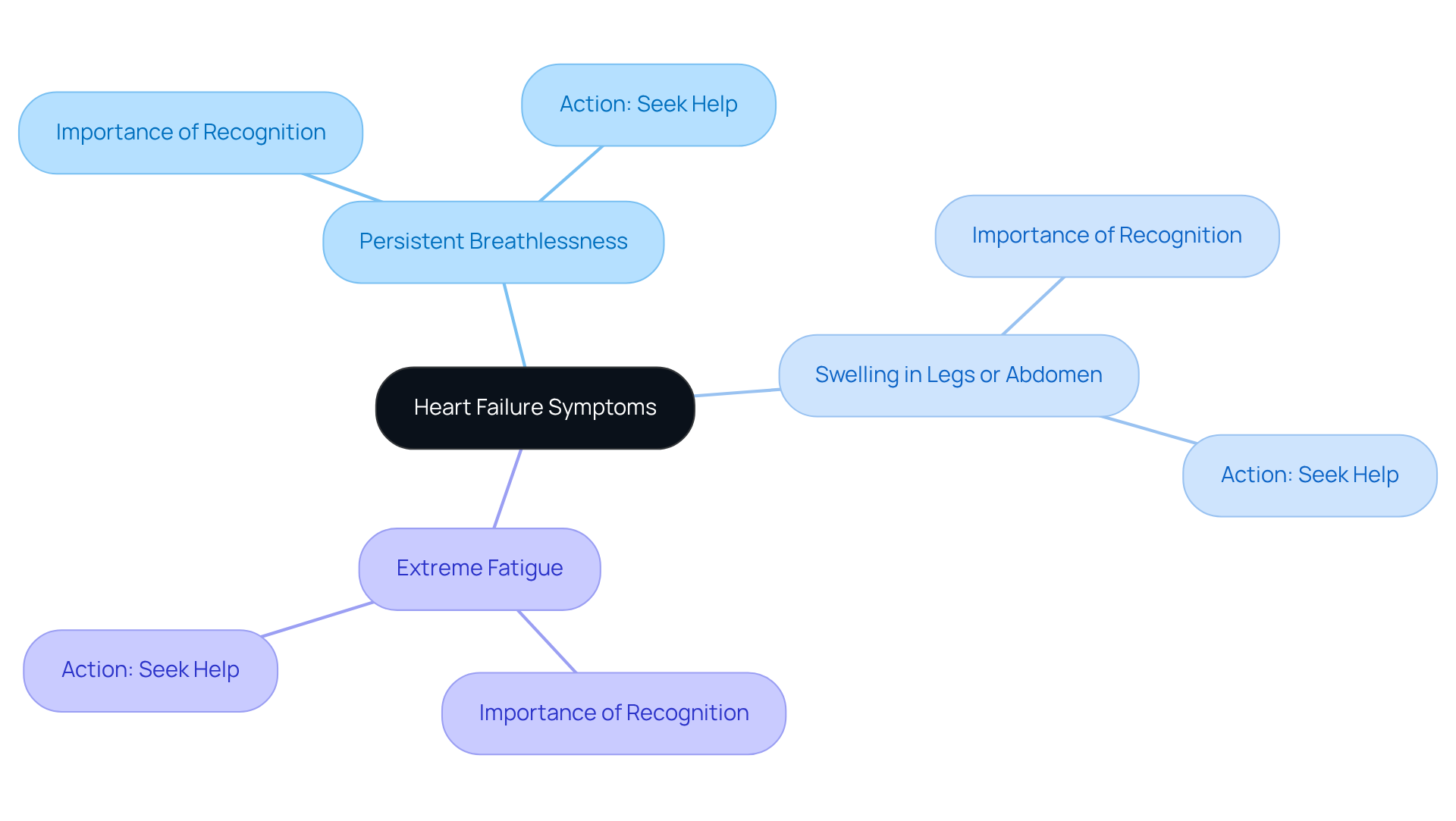
Recognizing the early signs of heart failure is crucial, especially for elderly patients who may experience subtle symptoms that can easily be overlooked. This article highlights the importance of awareness regarding common heart failure symptoms such as:
By understanding these indicators, patients and their caregivers can seek timely medical advice, significantly improving cardiovascular health management.
Key arguments discussed include the role of comprehensive cardiac assessments in identifying specific causes of symptoms and the innovative treatments available at Amavita Heart and Vascular Health. A proactive approach to educating patients about the signs to watch for, combined with advanced diagnostic technology, empowers individuals to take charge of their health. Furthermore, addressing the emotional well-being of patients is essential, as mental health can significantly impact treatment adherence and overall quality of life.
In conclusion, the significance of recognizing heart failure symptoms cannot be overstated. By remaining vigilant and informed, elderly patients can take meaningful steps toward better heart health and overall well-being. It is imperative to communicate any changes in health to healthcare providers promptly, as early intervention can lead to improved outcomes and a healthier future. Remember, support is available, and understanding these signs is a vital part of managing heart health effectively.
What are the early signs of heart failure to look out for?
Early signs of heart failure include shortness of breath, persistent coughing, fatigue, and swelling in the legs.
Why is it important to recognize these symptoms early?
Recognizing early symptoms of heart failure is crucial for timely medical intervention, which can significantly improve cardiovascular health management and outcomes.
What specific issues can cause shortness of breath in heart failure patients?
Shortness of breath may occur due to the heart struggling to pump blood effectively, often resulting from valvular issues that cause the heart to work harder.
What percentage of individuals over 75 experience cardiac issues?
Approximately 20% of individuals over 75 experience cardiac issues, with shortness of breath being a common symptom in this age group.
How does swelling in the legs and ankles relate to heart failure?
Swelling in the legs and ankles, known as edema, can indicate fluid accumulation due to cardiac dysfunction, signaling that the heart may be struggling to pump blood effectively.
What should individuals and caregivers monitor regarding swelling?
Individuals and caregivers should be vigilant about any sudden or unexplained swelling, as it could signal heart failure symptoms. Monitoring sudden changes in weight is also important, as it can indicate worsening fluid retention.
What kind of treatments does Amavita Heart and Vascular Health offer for heart failure?
Amavita offers comprehensive cardiac assessments to identify causes of symptoms and create personalized treatment plans. Dr. Martinez-Clark specializes in minimally invasive valve treatments that can improve breathing and energy levels.
How does Amavita utilize technology in heart failure management?
Amavita employs innovative AI-powered diagnostic technology as part of the CardioElite™ program to enhance early detection and improve patient outcomes.
What is the significance of timely medical attention for heart failure symptoms?
Seeking prompt medical attention for heart failure symptoms can lead to improved treatment options and a better quality of life for patients.